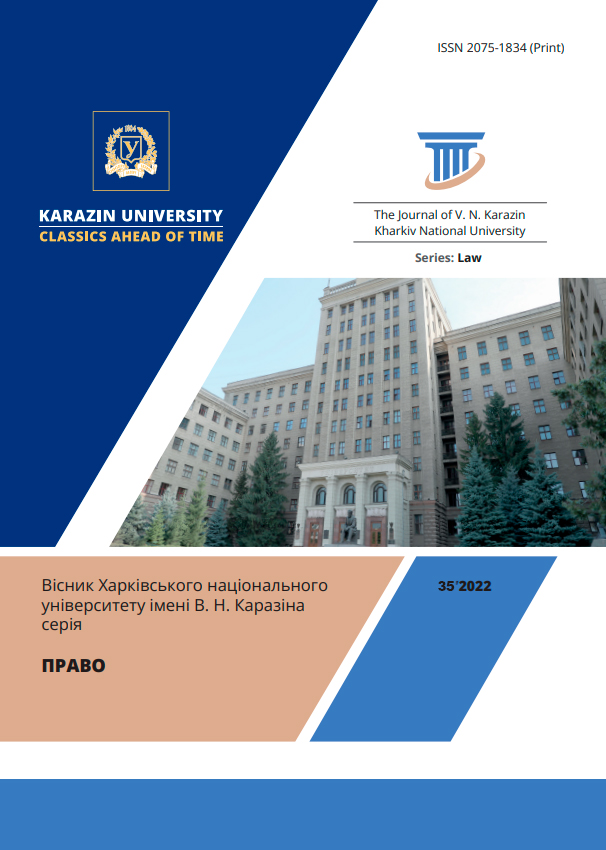The principle of operation as a procedural tool of administrative jurisdiction
Abstract
Introduction. By its very nature, administrative proceedings can be considered the main tool for protecting the rights and interests of individuals and legal entities in the public legal field against violations by subjects of authority. Such protection must be based on a fair, impartial and timely hearing. A legal and well-founded decision of the court, which resolves the dispute on the merits, may lose its significance or significantly reduce its importance for the protection of the rights of the individual, if it is adopted with an unreasonable delay. The main direction in the development of the modern administrative process in most countries of the world is characterized by the optimal ratio of the procedural activities of the parties and the court. The classic model of competitiveness is inferior to another model, the essence of which is the implementation of the ideas of judicial economy.
In the science of the administrative process, the time limits of the process are associated with the implementation of the requirements of efficiency, speed, concentration, and procedural economy. These concepts determine the place and meaning of procedural terms in the mechanism of legal regulation of procedural legal relations and are related to the fulfillment of the task of timeliness of judicial protection, enshrined in Art. 2 of the Code of Administrative Procedure of Ukraine.
Short list of main results. The article is devoted to the study of the concept and essence of the principle of efficiency as a procedural tool in the administrative proceedings of Ukraine. It has been established that the importance of this principle is due to the constant dynamics and specificity of the administrative process, changes in socio-economic conditions in the state, and the desire to raise the national standards of the judiciary to European standards. It is justified that the principle of efficiency is reflected in the content of procedural norms of administrative legislation.
Conclusions. The principle of efficiency is an independent principle of administrative proceedings that requires immediate legal regulation in procedural legislation.
Downloads
References
/References
Коханська М. Принципи цивільного судочинства, які забезпечують своєчасність судового захисту. Підприємництво, господарство і право. 2018. № 9. С. 14-18
Кодекс адміністративного судочинства України: Закон України від 15.12.2017 р. № 2747-IV. URL: http://zakon0.rada.gov.ua/laws/show/2747-15
Висновок № 2 (2001) Консультативної ради європейських суддів до уваги Комітету Міністрів Ради Європи щодо фінансування та управління судами у контексті ефективності судової влади та статті 6 Європейської конвенції з прав людини: міжнародний документ від 23 листопада 2001 року, № CCJE (2001). URL: http://www.vru.gov.ua/content/file/Opinion_02.pdf
Постанова Великої Палати Верховного Суду від 22 вересня 2020 року у справі № 910/3009/18. URL: https://reyestr.court.gov.ua/Review/91901363
Постанова Верховного Суду від 3 липня 2019 року у справі № 761/6343/17. URL: https://reyestr.court.gov.ua/Review/9714993
Рекомендация R (95)5 Комитета министров государствам-членам относительно введения в действие и улучшения функционирования систем и процедур обжалования по гражданским и торговым делам: міжнародний документ від 07.02.1995 № R(95)5. URL: https://zakon.rada.gov.ua/laws/show/994153#Text
Дика Д.О. Засада раціональної процесуальної форми у діяльності Європейського суду з прав людини. Європейські перспективи № З, 201З. С. 177–183.
Kokhanska M. Principles of civil justice, which ensure timeliness of legal protection. Entrepreneurship, economy and law. 2018. No. 9. P. 14-18. (in Ukrainian).
Administrative Judicial Code of Ukraine: Law of Ukraine dated 12/15/2017 No. 2747-IV. URL: http://zakon0.rada.gov.ua/laws/show/2747-15 (in Ukrainian).
Opinion No. 2 (2001) of the Consultative Council of European Judges for the attention of the Committee of Ministers of the Council of Europe on the financing and management of courts in the context of the effectiveness of the judiciary and Article 6 of the European Convention on Human Rights: international document of 23 November 2001, No. CCJE (2001) . URL: http://www.vru.gov.ua/content/file/Opinion_02.pdf (in Ukrainian).
Resolution of the Great Chamber of the Supreme Court of September 22, 2020 in case No. 910/3009/18. URL: https://reyestr.court.gov.ua/Review/91901363 (in Ukrainian).
Resolution of the Supreme Court of July 3, 2019 in case No. 761/6343/17. URL: https://reyestr.court.gov.ua/Review/9714990 (in Ukrainian).
Recommendation R (95)5 of the Committee of Ministers to member states regarding the implementation and improvement of the functioning of systems and procedures for appeals in civil and commercial cases: international document dated 02.07.1995 No. R(95)5. URL: https://zakon.rada.gov.ua/laws/show/994_153#Text (in Ukrainian)
Dyka D.O. The principle of a rational procedural form in the activities of the European Court of Human Rights. European perspectives No. З, 201З. P. 177–183. (in Ukrainian).
Copyright (c) 2023 Віталія Борякіна

This work is licensed under a Creative Commons Attribution 4.0 International License.




